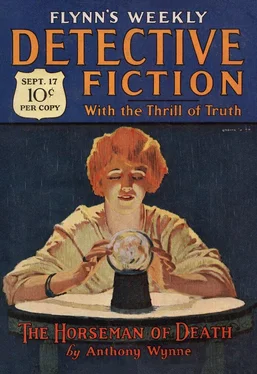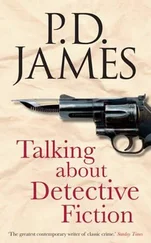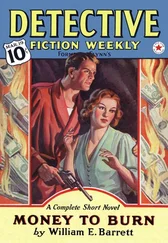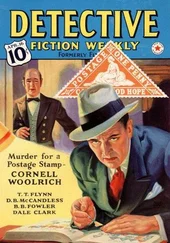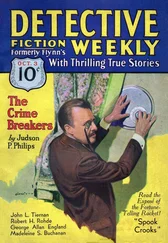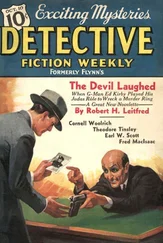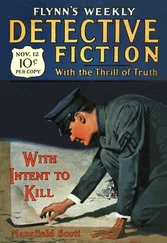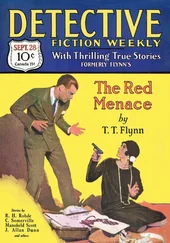Valentine - Flynn’s Weekly Detective Fiction. Vol. 27, No. 1, September 17, 1927
Здесь есть возможность читать онлайн «Valentine - Flynn’s Weekly Detective Fiction. Vol. 27, No. 1, September 17, 1927» весь текст электронной книги совершенно бесплатно (целиком полную версию без сокращений). В некоторых случаях можно слушать аудио, скачать через торрент в формате fb2 и присутствует краткое содержание. Город: New York, Год выпуска: 1927, Издательство: The Red Star News Company, Жанр: Детектив, на английском языке. Описание произведения, (предисловие) а так же отзывы посетителей доступны на портале библиотеки ЛибКат.
- Название:Flynn’s Weekly Detective Fiction. Vol. 27, No. 1, September 17, 1927
- Автор:
- Издательство:The Red Star News Company
- Жанр:
- Год:1927
- Город:New York
- ISBN:нет данных
- Рейтинг книги:5 / 5. Голосов: 1
-
Избранное:Добавить в избранное
- Отзывы:
-
Ваша оценка:
- 100
- 1
- 2
- 3
- 4
- 5
Flynn’s Weekly Detective Fiction. Vol. 27, No. 1, September 17, 1927: краткое содержание, описание и аннотация
Предлагаем к чтению аннотацию, описание, краткое содержание или предисловие (зависит от того, что написал сам автор книги «Flynn’s Weekly Detective Fiction. Vol. 27, No. 1, September 17, 1927»). Если вы не нашли необходимую информацию о книге — напишите в комментариях, мы постараемся отыскать её.
Flynn’s Weekly Detective Fiction. Vol. 27, No. 1, September 17, 1927 — читать онлайн бесплатно полную книгу (весь текст) целиком
Ниже представлен текст книги, разбитый по страницам. Система сохранения места последней прочитанной страницы, позволяет с удобством читать онлайн бесплатно книгу «Flynn’s Weekly Detective Fiction. Vol. 27, No. 1, September 17, 1927», без необходимости каждый раз заново искать на чём Вы остановились. Поставьте закладку, и сможете в любой момент перейти на страницу, на которой закончили чтение.
Интервал:
Закладка:
“That,” she replied, “is quite unlikely. Dave was very methodical. I’m certain he must have had the story with him when he was—”
“Then,” Barrow interrupted her, “ it seems to me that our next move is to ask Parkinson, of the Master Sleuth, about it.” She agreed, and within three minutes Barrow was on his way to the offices of Master Sleuth, the copy of “Power” in his pocket.
Parkinson received him cordially when he told the editor who he was, and spoke to him of the story.
“ Have you seen it before?” he asked, as he handed over the manuscript.
“ No,” Parkinson replied. He read through a page or two before handing it back to the Citadel man.
“It’s Gulliver’s stuff all right,” he said. “I’d recognize it anywhere. But I’ve never seen this.”
Barrow was plainly disappointed.
“Well,” he offered, “selling stories is out of my line, but I promised Mrs. Gulliver I’d leave it with you for your consideration. I guess maybe she’d like to see it printed if it’s good enough.”
Parkinson smiled.
“His stories usually are,” he said. “I’ll be glad to read it.”
Barrow left a card and withdrew. He was off on another track now, his objective this time being the offices of the Morning Sphere. He would try to establish a motive for the killing of Fred Tasney.
He had spoken to a number of the late editorial writer’s associates, all of whom assured him that, so far as they knew, Tasney had no enemies, when he determined upon another approach to this phase of the killer’s activities. He asked that he be permitted to read some of Tasney’s editorials dealing with the death of Gulliver.
“It may be,” he told Lauter, the Sphere’s managing editor, “that something Tasney said inflamed the man, just as he resented Balcolm’s attack. I’d like to find out.”
Lauter produced the clippings from the Sphere’s morgue, and Barrow sat down to study them.
It was after he had finished the fourth editorial dealing with the mystery outlaw that Barrow began to see a rift in the tangled mass of theories which had grown out of the killings.
Throughout his writings Tasney had placed a peculiar emphasis on the declaration “there is no perfect crime.”
Could it be — it undoubtedly was — well, anyway.
Barrow hastily gathered the clippings together and returned them to Lauter.
“Get anything?” the editor asked him.
Barrow was cautious.
“Not a thing,” he replied. “It looks hopeless.”
Lauter nodded in agreement. The Sphere had been offering a reward ever since Tasney’s death to any person who might bring his slayer to justice, and Barrow was only one of a score who had gone through the same motions without result.
The Citadel man had not found a dew of importance. But he was convinced by this time that there was special significance in the two-word legend on the slips of death which had been placed in the respective pockets of the victims.
“There is,” he repeated as he left the Sphere office. “Of course, that’s what he means to say. ‘There is a perfect crime.’ How stupid we’ve all been.”
Even so, this finding led to nothing of importance, and the days dragged slowly for Barrow. He was beginning to tire of the chase, which always led back to the starting point.
The police had been equally powerless, they, like Barrow, finding their sole consolation in the fact that the killer had been under cover since the Balcolm attack.
Chapter VII
“Not”
Barrow returned to his home one evening fagged out. He had been working on the Parberry end of his hunt and the day had been spent in questioning the maid and butler and going over the route the police assumed was taken by the outlaw.
The investigator found nothing to indicate that they had been mistaken, and consequently was as far away to-night as he had ever been from a solution of the mystery.
He found a note on his dressing table.
“Mr. Parkinson, of the Master Sleuth Magazine, has been trying to get you all day,” the message read. “He says it’s very important.”
Instantly the fatigue was forgotten. Barrow hastily changed his clothes and sought Parkinson’s home telephone number. Throughout the evening he tried every channel of information without success until he thought of the Press Club. There he was told to try the Alcazar, and after several minutes of waiting the editor was raised.
“This is Barrow, Parkinson,” the Citadel man said. “You were trying to get me?”
Parkinson assured him that he certainly had been.
“We can’t discuss it by telephone, Barrow,” he told him. “All the information I have is at the office. Come down early in the morning, eh?”
What was there to do but agree? This Barrow did with good grace and, after a restless night, he presented himself before Parkinson when the editor reached his office the next day.
“I think, Barrow,” Parkinson observed quietly, “that what I am about to tell you will be a surprise.”
“Yes?” Barrow was intent.
“You recall the manuscript, ‘Power,’ that you brought down from Mrs. Gulliver?”
Barrow nodded.
“Well,” Parkinson went on, “we got another through the mails yesterday, one called ‘Leverage.’ ”
The Citadel man could not fathom the editor’s conversation.
“What of it?” he asked.
“I thought you’d ask that,” Parkinson smiled. “Not much, only this. It’s Gulliver’s story in masquerade.”
Barrow’s eyes glistened.
“Are you sure?” he asked.
Parkinson was certain.
“I’ve been handling manuscripts twenty years,” he observed, “and, even if I hadn’t, this steal is too palpable to miss. There are whole pages lifted verbatim. But the story has been considerably changed.”
“In what way?”
This was a supreme moment for the editor, and he enjoyed the jolt he handed Barrow as he spoke again.
“In this way: Gulliver’s story, as all of his detective yarns had a way of doing, ended with the authorities triumphant, the criminal in custody and the wrongs by the culprit avenged.”
“This new version runs the other way about. It deals with the perfect crime, the police are outwitted constantly, there is no arrest and the criminal himself is glorified.”
Barrow was no longer doubtful about the significance of this manuscript. Unquestionably the killer had made his one mistake and vanity, together with a desire to boast, were responsible.
At the investigator’s suggestion, Parkinson forwarded a letter to the address written on the top of the first page of the story. The author had signed himself “Don Regneva.” The letter asked that the man call to see the editor of Master Sleuth the following afternoon at three.
“With some exceptions,” Parkinson wrote, “I find your story, ‘Leverage,’ excellent material for our publication. I feel that a short talk will convince you of the merit of our suggestions and that you will be glad to make the changes.”
Barrow and Parkinson discussed at length the reception of the suspect, and it was determined that the editor should do all the talking during the interview. Barrow purposed to sit within easy range of the stranger and watch for hostile gestures.
Parkinson himself readily agreed to secrecy, for the Citadel’s investigator feared the slightest move might scare off the suspect, who, he was convinced, was responsible for three murders.
Hence, when the following afternoon’s excitement began, Parkinson’s office was functioning as it always did — with quiet efficiency.
Promptly at three o’clock the door opened and Barrow saw a man step to the information desk and make an inquiry. Almost immediately Parkinson’s telephone bell rang and the editor directed that the visitor be shown in.
Читать дальшеИнтервал:
Закладка:
Похожие книги на «Flynn’s Weekly Detective Fiction. Vol. 27, No. 1, September 17, 1927»
Представляем Вашему вниманию похожие книги на «Flynn’s Weekly Detective Fiction. Vol. 27, No. 1, September 17, 1927» списком для выбора. Мы отобрали схожую по названию и смыслу литературу в надежде предоставить читателям больше вариантов отыскать новые, интересные, ещё непрочитанные произведения.
Обсуждение, отзывы о книге «Flynn’s Weekly Detective Fiction. Vol. 27, No. 1, September 17, 1927» и просто собственные мнения читателей. Оставьте ваши комментарии, напишите, что Вы думаете о произведении, его смысле или главных героях. Укажите что конкретно понравилось, а что нет, и почему Вы так считаете.
